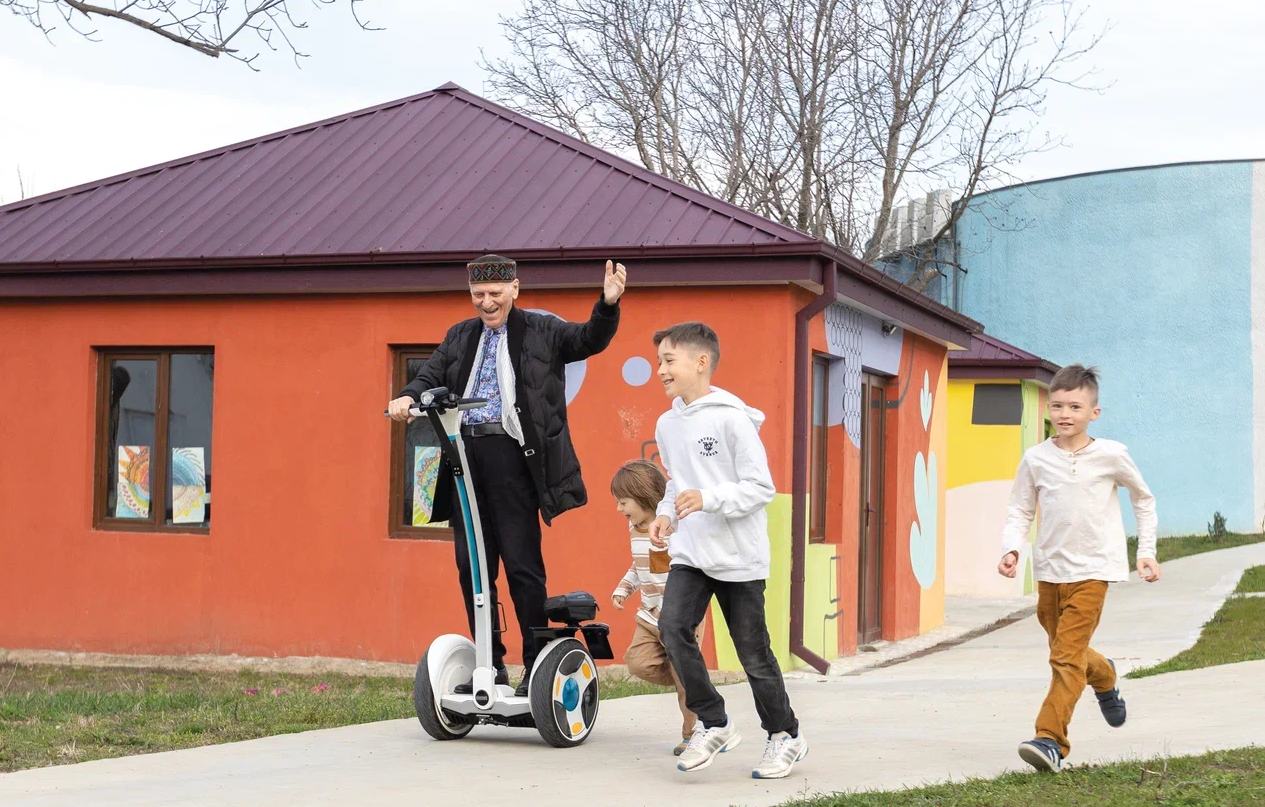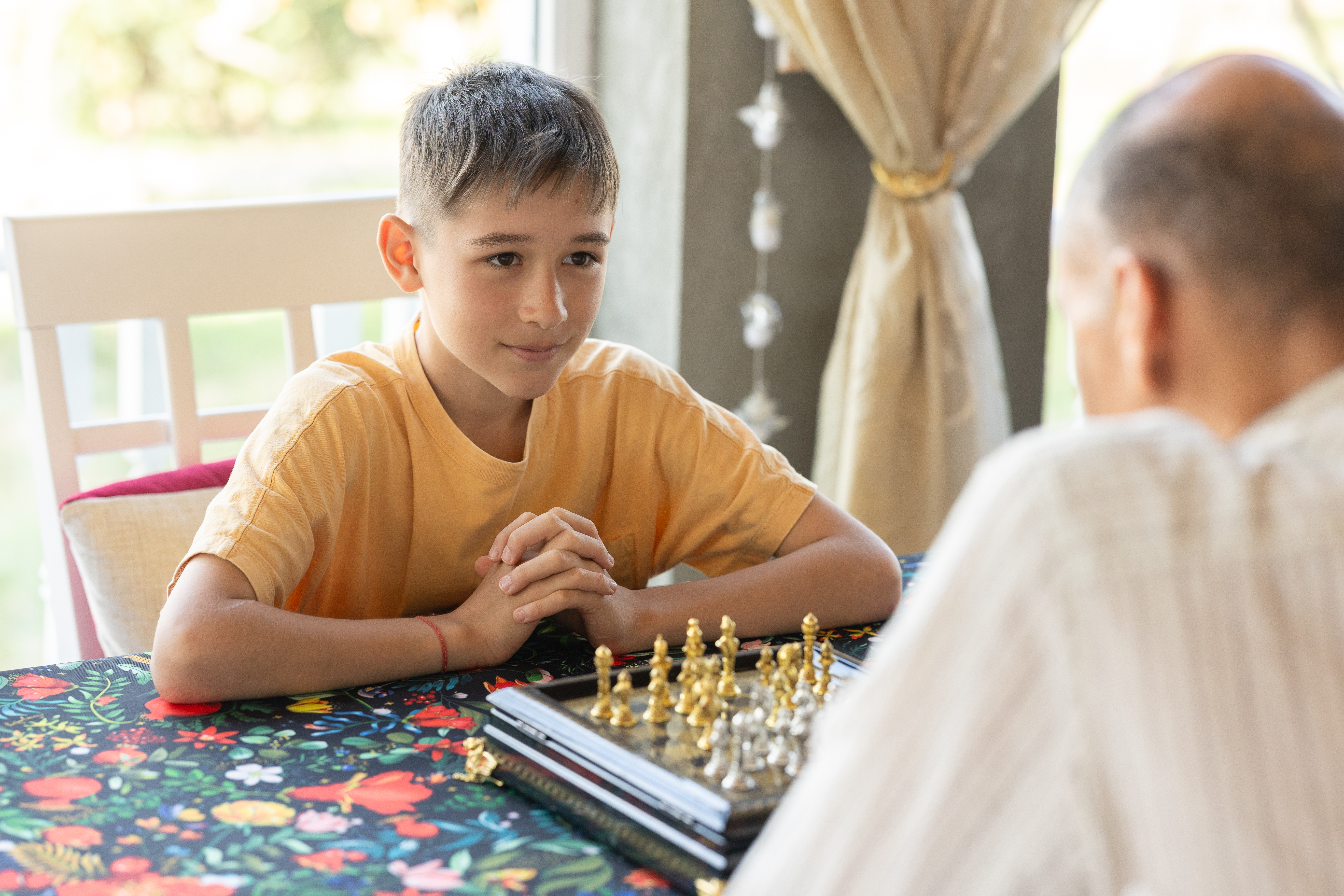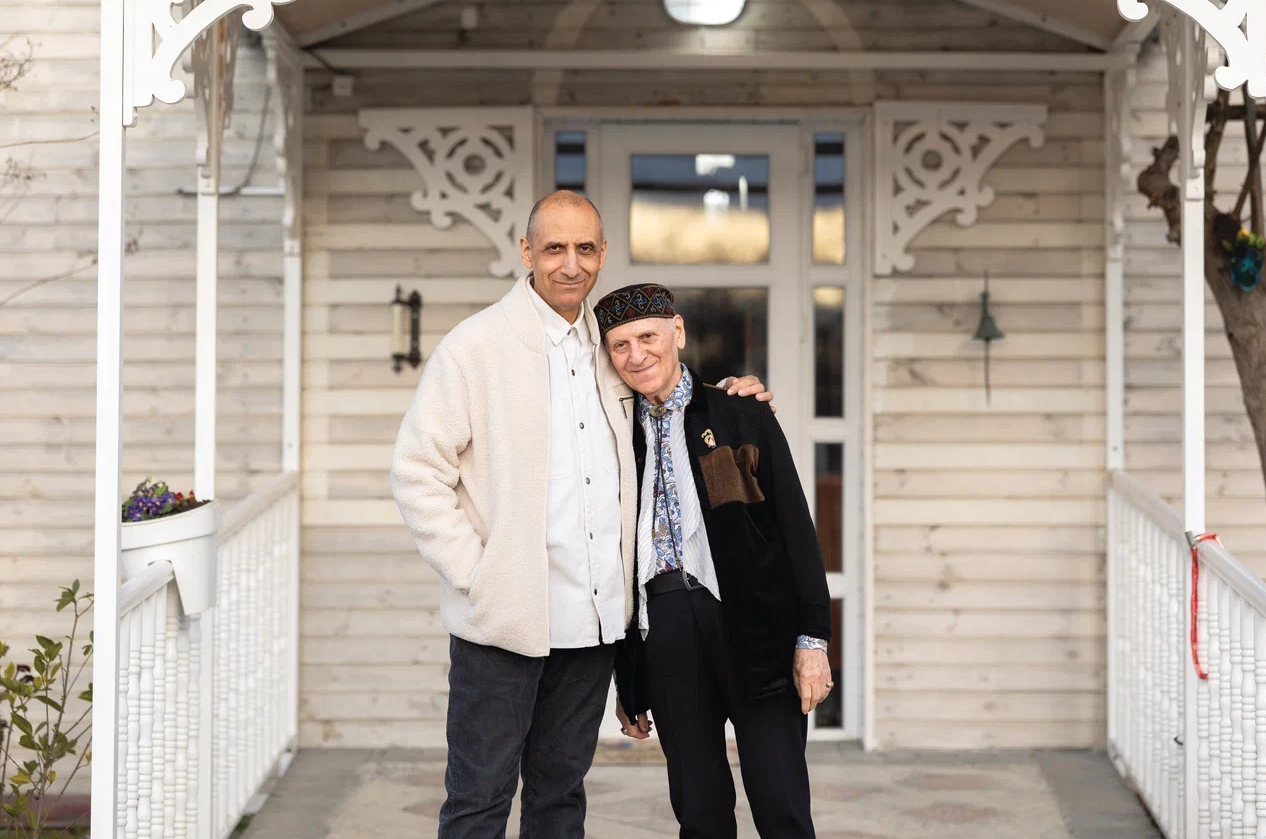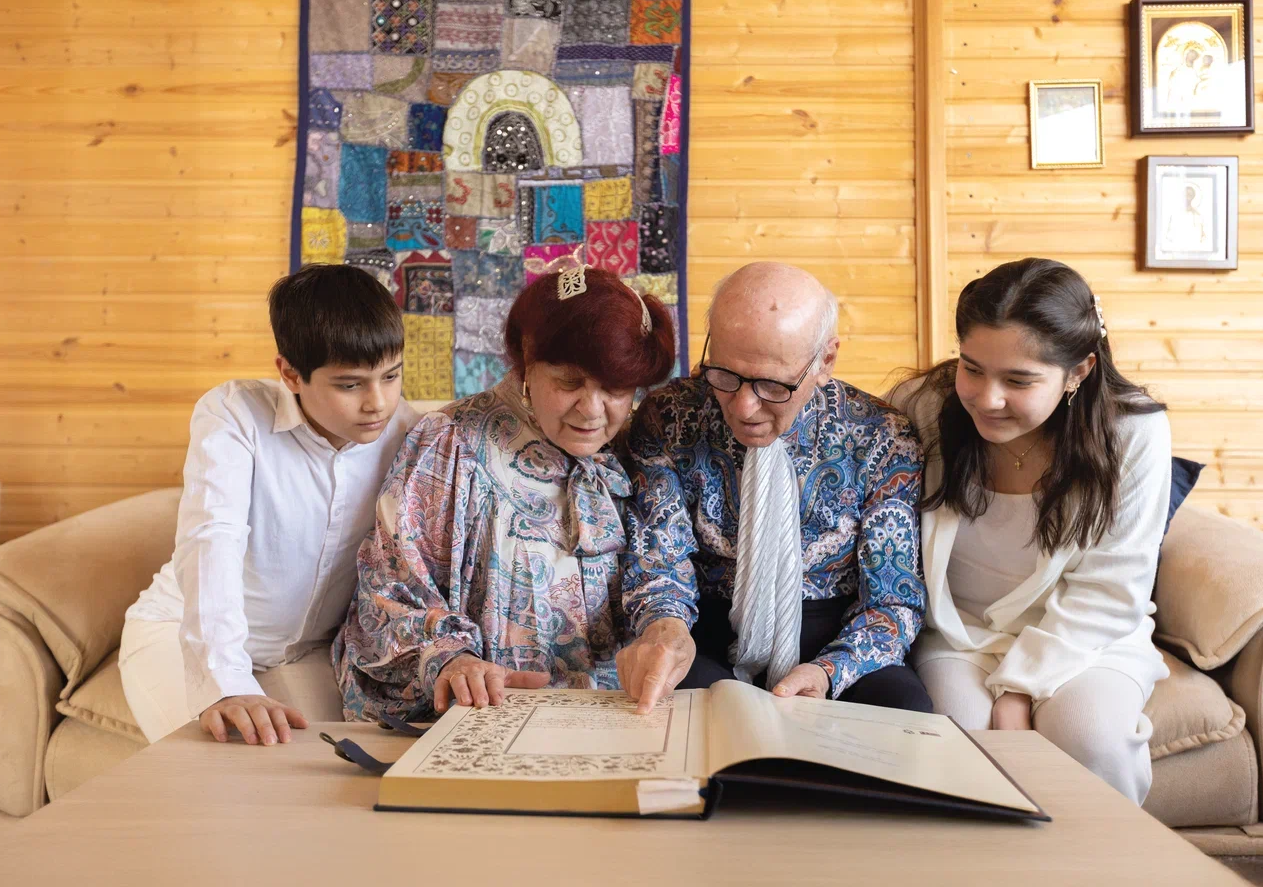
Culture • 03 April, 2025
The school of the future is a teacher who brings light
In an era of rapid technological development and constant reforms in education, pedagogical traditions remain key, especially in countries with a rich cultural heritage, such as Uzbekistan and Georgia. We are united not only by history, but also by a common view of education as a process of personality formation. We decided to discuss this topic with the humanist teacher Shalva Amonashvili, who visited Tashkent with a lecture on education. He told us why education without spirituality loses its meaning, how to raise a child in love and what it means to be a real teacher.
— Shalva Aleksandrovich, what influenced your understanding of education and love?
— It’s hard to say for sure. Probably , my whole life, which I lived , starting from infancy… My parents were very kind people. My father worked in a printing house, from where he often brought interesting books. My mother was a housewife, she completely devoted herself to raising my sister and me. Unfortunately, my father died in the war in 1942, and the care of us fell on the shoulders of my grandmother, a wise and kind woman. She read prayers to me, and although I did not believe in God, her words filled my soul with warmth. Every time she began to pray, I told her that there was no God, and she answered: “There is a true God, and you – just listen to me.” And I listened to her voice with rapture. These memories have stayed with me forever.
Another very important circumstance. At school I met a real mentor - my teacher Varvara Vardiashvili. She is the teacher who helped me become who I am now. The name Ilia Vardiashvili is translated from Georgian as "pink", and this perfectly reflects her character . She taught her native language and literature, and, unlike many teachers, she simply loved her students. There was a lack of love at school - the teachers were preoccupied with their own problems, and this reflected on us. Most of them were simply strict and demanding, but Varvara Vardiashvili was the one who loved children by nature , and it was in love that she sought solutions to all problems. I adopted many principles from her, which later became the basis of my teaching activities.
There were those who gave me sound advice on how to act in different circumstances, those who supported me and led me through life. But there were also those who expressed their disagreement with my methods of work. This was especially evident when I began to conduct pedagogical experiments with my colleagues - many traditionalists rebelled against us. They could not or simply did not want to accept the new principles of education, they saw us as a threat to their canons and teaching methods. I had to face opposition, denunciations and slander. Sometimes I felt helpless because I had no way to defend myself from their attacks. But there were always people nearby who supported me, and this helped me move forward .
— Have you been to Uzbekistan before? What impressions did you have from previous visits?
— I first came to Uzbekistan in 1989. At that time, my trip was connected with a special mission: I had to go to Afghanistan as a representative of the Supreme Soviet of the USSR to free a Georgian prisoner. Afterwards, I briefly visited Tashkent, but I had almost no time to get to know the country.
My current visit is completely different. I meet teachers, observe their work and am amazed by the culture of respect - I feel it in communication with each of them, although I do not deserve such warmth from strangers . I do not think that I have done anything special for which I am ennobled with such honors , and yet the exceptional attention, intelligence, desire for knowledge sincerely please me . I especially remember meeting with teachers in several schools: they listened, asked questions, sought to understand humane pedagogy more deeply. Their sincere interest impressed me, and I am immensely grateful to my colleagues.
— What does humane pedagogy mean to you , and how does this approach make the educational process more humane? — It would not be entirely wrong to say that humane pedagogy makes the educational process more humane , and humanizes it as a whole . It is not just a method, but a whole philosophy. Its roots go back to the works of Comenius, Pestalozzi, Ushinsky, Sukhomlinsky, Montessori. I tried to create a system of views and ideology, a mixture of psychology and philosophy, which would help modern teachers to understand and accept new principles. Time goes by, and everything changes with it. Even the exact sciences are subject to change, what can we say about art? And pedagogy is an art. The main concept in humane pedagogy is spirituality. If parents raise their children with love and respect, they themselves come to a humane approach. But if they replace humanity with authoritarianism (and many like to do this), then real pedagogy turns into an instrument of pressure. And then they complain that our principles are ineffective, although in fact they use authoritarian education. Also, many teachers say that they love children. But can love be shown only through tests, grades, calling parents to school? Such methods do not promote love. How can a student love a teacher who conducts a test, then underlines the mistakes in red ink, and then scolds : “Why do you make such mistakes? I explained it many times!” There is no room for love in such an atmosphere. An irritated teacher transmits his irritation to the child, and this does not lead to anything good. It turns out that there is neither full-fledged education nor upbringing in the classical sense at school. Education is called the usual process of learning, substituting concepts. But education is something more. Not even more, but the main thing. It covers not only learning, but also development, personality formation and much more. However, we do not have a full-fledged educational process, although we issue certificates of secondary education. But does the child have a secondary education? He has only a certain set of knowledge, which we conventionally call the average level. However, education is not just knowledge. It is the ability to think, to look at the world philosophically. It is faith in something sacred. School should give the child a foundation on which he can rely in life. Give him something sacred - moral guidelines, an understanding of the importance of loving and respecting others, or at least show that there are different views in the world, because the child should know about this and have the opportunity to make his own choice. What does school give? Only knowledge without understanding how to apply it. Thus, humane pedagogy is replaced by authoritarian values. Here is a simple example: in some religions, it is believed that earthly life is a preparation for eternity. Why can’t you tell a child: “There are different points of view. Some say that there is no soul, and therefore, no eternity. Others say that the soul exists.” He must have a choice. This is the essence of humane pedagogy. It gives freedom of choice, forms not only the intellect, but also the spirit of a person. You can do it selfishly: "This is my joy, my future, my gold", or you can do it consciously, understanding that this is not just your child, but a soul entrusted to you for upbringing. True upbringing is preparing a person to bring happiness to others. Humane pedagogy reminds: love children, follow these commandments. A teacher is the one who carries the light , and if this light burns inside, then even the subject he teaches takes on a new meaning. School should not just teach, but form a personality. Then we will get not just students, but thinking, spiritually rich people. True education is the education of the spirit, not merely the transmission of knowledge. — What values do you consider fundamental for a strong family and successful upbringing? — The value I want to talk about is not just my personal one. It is a universal principle, the foundation of family and life itself. We are talking about sincere love between spouses — love that gives birth to care for each other and for children, leaving less and less room for conflict. Of course, disagreements are inevitable. But what does it mean to love? It means being able to forgive and give in. The one who takes the first step towards you shows wisdom and fortitude. Say: “Yes, darling, what’s the difference? I love you. Do as you see fit. If you want to go, let’s go. If you don’t want to, fine, we’ll stay.” And then she, feeling cared for, will respond in kind: “Darling, I trust you. Let’s do as you suggest.” This is how conflicts disappear and mutual understanding becomes stronger. This is a real family - when there is trust, love becomes deeper, stronger, filled with true care. Someone needs to explain to young guys and girls who are just planning to start a family: "Son, getting married is easy, but there is something much more complicated behind it. You are no longer alone, there are two of you. You are losing some of your freedom, because now you have to take into account the opinion of someone close to you. You promised to make her happy - so keep that promise." This needs to be discussed , because the foundations of family life are, first and foremost , humane values. — How do you combine your personal beliefs with your professional activities in education? — Professional activity inevitably becomes part of personal beliefs — everything in life is intertwined. I do not adapt to circumstances, but remain myself. It is not the profession that defines me, but I myself fill it with my character, my values. This is how I build my work in education. A teacher should not offend children. Even in the strictest schools, he must respect them - this is the law. But in reality, this is often violated. Why? Because personal qualities sometimes replace rules , and humane pedagogy is good by its nature. It does not depend on external conditions. Wherever I am - at a meeting, at lunch, in front of an audience - my inner values, philosophy and views on the world always manifest themselves. A profession is something deeply personal. Some perceive work as a separate part of life: come, work, leave. For me, it is an extension of my character, my worldview. There is an opinion that people wear different masks: a child - in front of parents, a friend - among relatives, a student - in front of a teacher. But I think it is better to be yourself everywhere. Not to hide behind images, not to adapt, but to remain who you are. I don't change depending on the person I'm talking to. Whether it's a conversation with you, a conversation with my son, colleagues or friends - I remain myself. After all, a mask is an attempt to hide the truth, and I choose sincerity. In the family, in the profession, in life.


— What differences and similarities in approaches to education have you noticed between Georgia and Uzbekistan?
— Georgian traditional education retains many valuable qualities, although some of them require rethinking in modern realities. But among its main advantages are deep respect for elders, special respect for women, strong family ties, devotion and love for parents. These values form responsibility, respect and a sense of duty in a person from childhood, creating a solid foundation for a harmonious society.
Such traditions are also inherent in Uzbek culture. They are passed down from generation to generation, preserving a spiritual foundation in a world where traditions are gradually being eroded. However, it is important not only to preserve them, but also to adapt them to modern times so that they remain viable and useful for future generations.
At the same time, some established beliefs may not only be wrong, but also harmful. For example, the expression: "If you want a child to become your friend, raise him as an enemy" does not stand up to criticism. Trust and respect are not built on fear and confrontation. You cannot expect friendship if you raise a child in an atmosphere of conflict.
Children who grow up in constant struggle do not learn love and trust. On the contrary, they develop aggression, wariness, and a desire for competition. They begin to perceive the world as a battlefield, and their loved ones as competitors. But is this the basis for a strong family?
The person you raise your child to be is the person he will become. If you cultivate hostility, he will see enemies around him. But if you surround him with love, respect and support, he will learn to respond in kind. Family is not a place for fighting for power, but a space of trust, understanding and care. This is the only way to create a society where respect is born not from fear, but from sincere love. — Georgia and Uzbekistan are countries with rich tea traditions. In this issue of the magazine, we have paid special attention to tea ceremonies. Tell us, what kind of tea do you prefer? — Our whole family loves herbal teas – they fill the house with coziness and bring true warmth. If I have to choose between black and green tea, I usually lean towards green – its fresh, slightly tart taste is invigorating and gives a sense of harmony. I also enjoy discovering new flavors and trying exotic teas. One of the most delightful discoveries for me has been Uzbek mountain tea – it is incredibly aromatic, rich, and leaves a pleasant aftertaste, as if transporting you to mountain valleys filled with natural freshness and strength. — What modern problems in education do you consider to be the most pressing, and how does your approach help to overcome them? — One of the main problems of modern education is the loss of spirituality. And it’s not that it doesn’t exist at all, but that the authoritarian system simply leaves no room for it. But spirituality cannot be forced into existence—it cannot be regulated or written into standards. The only way out is to let the outdated system live out its days and give way to a humane education based on respect, personal development, and meaningful learning. Some teachers continue to work using old methods because they cannot do otherwise. So be it. But there are those who are ready to build something new – they are the ones who need to be supported. It is impossible to reform a school from above. You can update textbooks, change standards, install new desks and equip classrooms with modern technology. But if the teacher himself does not change, if there is no "reform" of his soul, there will be no real renewal of the school. It may sound a little sad, but that's the reality. Humane pedagogy brings back the spiritual component to education, which is so lacking. I am convinced that if we change just this one aspect, many problems will resolve themselves.

— What recommendations would you give to those who are just starting their journey in pedagogy and are striving for a humane vision of education?
— If a young teacher comes to school after university, it is important for him to immediately focus on advanced ideas. You should not simply reproduce the patterns laid down in the university and rooted in the school system. You need to consciously free yourself from outdated approaches and build training on new principles.
A real new teacher is not someone who is young in age, but someone who has fresh, bold ideas. Age does not matter. Can a person who brings something new to education be called “old”? Of course not. It is ideas that make us young.
Therefore, it is worth starting with key concepts - spirituality, love, respect. Yes, there will be many difficulties along this path, but the main thing is not to return to authoritarian methods, not to give in to doubts, not to say to yourself: "What if I'm wrong?" or "It's easier to follow the old, beaten path." The past is over, it no longer exists.
It is important to look only forward - into the world where it is the teacher who is able to change the system for the better and find a true calling in his profession.
— How do you see the future of education, where love, respect and mutual understanding remain the most important things? — You know, yesterday I saw an amazing building, impressive in its scale of space and amazing beauty. Many imagine the school of the future as an ultra-modern building, equipped with the latest technology, with computers in every classroom and updated programs. But all this is just the outer shell. The real future of the school is determined not by technology, but by the teacher. It is his character, his views that form the new education. When a teacher with a lively, free mind comes to school, he is already creating the school of the future. Such a teacher does not cling to the past, but opens the way forward, inspiring students and colleagues. He is respected, people learn from him, he becomes a conductor of change. The school of the future is not about walls or technology. It is about the heart and mind of a teacher who changes education from the inside. Georgia is a country of rich culture, deep traditions, and strong family bonds. Here, people honor their ancestors' heritage, raise children with love and respect, and pass down values from generation to generation. Experience this incredible world for yourself – fly to Georgia with Centrum Air from just 138 USD!